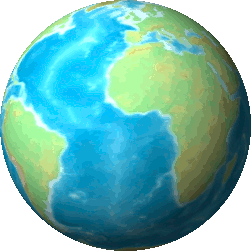
https://commons.wikimedia.org/wiki/File%3AWorldMap-A_non-Frame-498x498-animated36steps.gif
Attribution:By derivative work: Alexander.stohr (talk) 00:04, 8 January 2009 (UTC)WorldMap-A_non-Frame.png: Alexander Stohr (WorldMap-A_non-Frame.png) [GFDL
(http://www.gnu.org/copyleft/fdl.html) or CC-BY-SA-3.0 (http://creativecommons.org/licenses/by-sa/3.0/)], via Wikimedia Commons
On 17 July I was online and could see an interesting webinar about the importance of digital tools in the life of the teachers who develop their own PLN.
The webinar was run by Cambridge English Language Assessment and provided some ideas about how teachers can develop.
The two presenters , Sally Matson and Anna Lloyd interacted with the teachers and educators who were online and provided some tips about how we can learn together other educators and how to develop and share ideas, materials and interact with other teachers.
I am focussing on some key ideas which I feel everybody involved in teaching should be aware of.
Teaching today requires a lot of efforts in terms of self-development and thanks to the internet we can easily learn about new ideas and share tips and learn about what the others are doing.
PLN
The term refers to PERSONAL LEARNING NETWORK and defines an informal network consisting of people a learner interacts with and derives knowledge from. The term is used to define what you create, develop and maintain.
I think that like many teachers I have felt alone for years as it is not easy to work with the others in some schools . I wanted to share ideas and tips but often I had to cope with their opposition, it seemed to me that some never wanted to work together or discuss about their work and methodologies.
Ever since I started working online and met likeminded teachers things have changed. I also enjoyed working with other teachers when I was in Dublin some years ago: it was a European project for teachers and I realized that more and more teachers want to work together in projects.
Today we have global communities of teachers and we can easily work together also online, thanks to modern technologies we learn about them and we can share ideas.
What the two speakers underlined in the webinar was the importance of developing a reputation online.It is possible to meet virtual friends and educators who love discussing online and work with others as they feel that education is not a national issue but it involves educators, families and teachers.
While in the past most of the ideas were discussed in conferences and meetings , now we can have a global audience thanks to social media.Youtube, Linkedin,FB and Twitter can enable learners to find , share and create online resources. This implies that learner can control and manage their learning.
An important aspect of the connected educators is the relationship with their writing and blogging is becoming more and more important:
Blogging
The main focus was only on the main platforms but I must say that we have great bloggers that can help us learn about ideas, approaches and also new web tools.
Blogging is also useful for teachers when interacting with their learners.
The Digital Teacher
Teachers have a variety of resources they can rely on for learning: Moocs but also dedicated platforms which have just been created. The Digital Teacher can be one of the first website to check if you are beginning to work with modern tools.
It is important to get organized and to start following important people in education and also events. Twitter or FB can help the learners and the teachers to become more involved in learning about the new events and modern tools can help them to become organized in saving what they need to read about and reflect on:The webinar ended with encouraging words : Join In!
The event was a good introduction to what we mean by connected educators today and how teachers can develop online.
You can watch the recording online dealing with this event .








Nessun commento:
Posta un commento